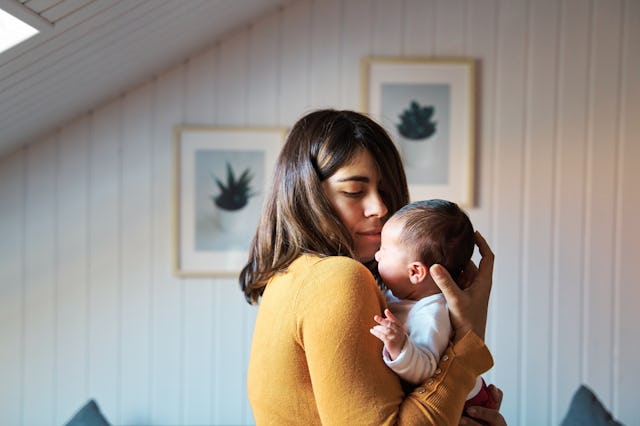Is Maternal Instinct A Myth? It’s Complicated, But Therapists Agree The Idea Is Problematic
It’s time to ditch this idealized (and, tbh, harmful) motherhood trope.

Among the many unfair and outdated societal pressures placed on women is the long-held (and widely accepted) belief of the “maternal instinct,” some innate drive that women have that means they not only want children but instinctively know how to care for them. The inherent belief in a maternal instinct has prevailed across generations and cultures for centuries, and it’s not just women hurt by the belief that some aspect of your sex and/or gender dictates whether or not you’re “designed” to be a parent. The idea of a maternal instinct hurts all of us — women with children, women who don’t want or can’t have children, men, those who don’t fit in the gender binary, and adoptive and foster parents — as it places people into boxes that they might not necessarily fit into.
And while it’s not anything new, the present-day nationwide attack on reproductive rights only serves to perpetuate these beliefs. Attacks on LGBTQIA+ rights are one and the same, with religious and right-wing extremists determined to strip marginalized groups from agency over their bodies.
But is it based on any actual biology, or is it a myth? Scary Mommy tapped two family-based therapists to break down the science of the maternal instinct and determine whether or not it’s the real deal.
What is maternal instinct, and what does science say?
Shontel Cargill, LMFT, regional clinic director with Thriveworks, describes it as “a mother having an innate sense of knowing their baby’s needs and having intuitive knowledge about exactly how to care for and support their children,” an alleged “sixth sense of sorts that only a mother gets,” as Y. Mimi Ryans, LCSW-C, owner and lead therapist at Lighthouse Center for Therapy & Play put it.
As for how that allegedly plays out in real life, per Cargill: The second a woman is handed her baby, she immediately falls head-over-heels in love thanks to a flood of “happy hormones” including oxytocin, serotonin, and dopamine that impacts behaviors, such as increased bonding, attachment, and protective behaviors. She instantly becomes the textbook image of a loving, nurturing mama bear.
But the science doesn’t necessarily support this idyllic version of motherhood. One 2018 study found that those warm fuzzy feelings sometimes take days or weeks to develop post-birth, with some women struggling to feel them many months later.
And while these hormonal changes do occur after someone gives birth, Cargill notes that fathers, partners, adoptive and foster parents, and other caretakers also experience high levels of oxytocin, serotonin, and dopamine after becoming parents. The conclusion? “Biologically, there aren’t many differences between how parents respond to having a newborn.”
What are the ramifications of the maternal instinct trope?
“The belief that women uniquely possess a tender temperament and emotional connection that is linked biologically to care for children is patriarchal in nature,” says Cargill. “This long-standing image of women being the primary caretakers for children has also perpetuated this idea of motherhood and what it ‘should’ look like. In reality, it truly takes a village to care for children, and the responsibility should not fall solely on mothers. This belief also takes away from the loving, caring environment fathers, adoptive parents, and other parental figures create to bond with, care for, and raise their children.”
“Essentially, maternal instinct is a myth that often applies significant pressures on mothers and sets an impossible expectation for ‘perfect mothering,’ often leading to postpartum depression and anxiety,” she adds. “The truth is that there is no such thing as perfect mothering or parenting. When children are born, there is no blueprint for parenting. Parenting involves an evolution of learned behaviors passed down from generation to generation which, again, often takes a village, not just the mother, to fulfill.”
Ryans notes that enforcing this so-called “superpower” makes women feel less-than and makes those who don’t feel that connection to children feel inferior in their own desires and abilities.
“When it comes to parenting, both partners have the ability to make an emotional connection with their little one and provide the support needed to care for their child,” says Cargill.
How do we unlearn this idea?
Just as parenting takes a village, chipping away at harmful and outdated stereotypes about motherhood does, too. “I believe unlearning the idea of maternal instinct is not something that women should do alone,” says Cargill. “It is important to empower the fact that parenting is a wonderful experience that is not only maternal in nature, but a parental experience. Children who grow and develop in a loving environment that includes not only the parents but extended family and friends is paramount to the success of those children. We must go beyond the biological factors and elevate the loving environment parents and support systems create for their children to help them live happy and successful lives.”
The TL;DR here: There is no such thing as a perfect parent, and no one sex and/or gender is better at parenting than any other. It takes endless love and a wide-reaching network of support and resources to parent a child, and there’s no one right or wrong way to do it. However you’re doing, you’re doing just fine.
This article was originally published on